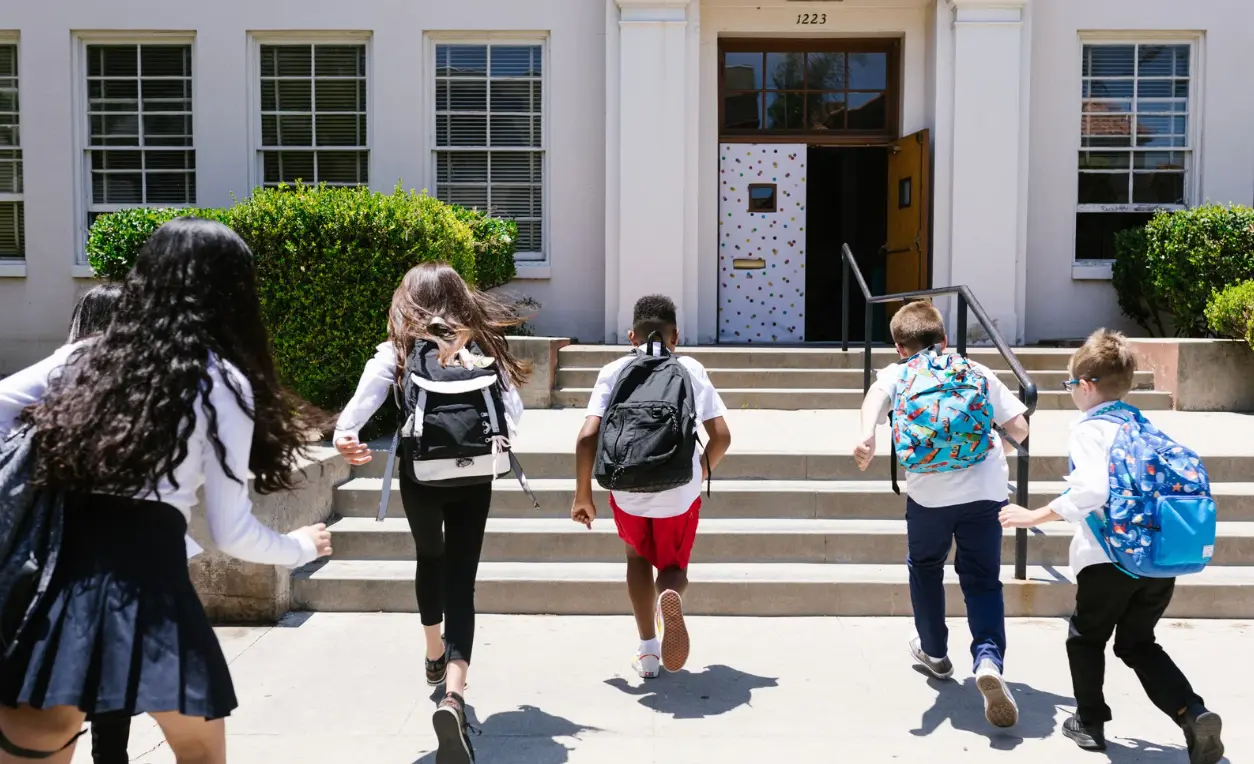
Many kids hate school, and understanding why do kids hate school is crucial for parents and educators. This article explores the main reasons behind children’s dislike for school, from academic pressure to social challenges, and offers practical tips to improve their experience.
Key Takeaways
- Kids often dislike school due to academic pressure, social challenges, and physical discomfort in the environment.
- Strong teacher-student relationships and open communication between parents and teachers can greatly impact a child’s attitude towards school.
- Alternative education options like homeschooling and online learning can provide tailored experiences for children struggling in traditional settings.
👉 Looking for extra support to help your child enjoy learning again? Explore our vetted tutors — trusted by parents to boost confidence and results.
Common Reasons Kids Dislike School

Many kids view school as a burden, a place where they constantly expend energy but rarely see the payoff. This feeling of unattainable learning, combined with the stress, tiredness, and boredom reported by many students, can make school seem like an insurmountable challenge. Recognizing these feelings is important as negative emotions about school can arise at any moment and affect many students. Addressing these issues directly can help children better cope with their love school experience.
These negative feelings don’t just appear out of nowhere. They are often rooted in various factors that shape a child’s overall attitude towards education. The physical and social aspects of the school environment, including its layout and sensory stimuli, play a significant role in shaping these attitudes. Social interactions, or the lack thereof, also contribute to whether a child dislikes school or a child hates school. Understanding these common reasons is the first step in making meaningful changes.
Academic Pressure
The pressure to achieve good grades is a significant source of stress for many students. High expectations and mastery can make school feel like a constant source of anxiety and worry. This pressure is often compounded for high school students who are preparing for college and feel the weight of their future on their shoulders. Economic hardships can add another layer of stress, making it even harder for students to focus on all the work in high schools.
Moreover, the education system’s focus on breadth over depth can lead to frustration. When students learn, they are bombarded with lessons that are either too difficult or boring, and they can quickly become disengaged. This academic pressure can make kids hate school, turning what should be a place of learning and growth into a source of dread, hating school.
Social Challenges
Social challenges are another major factor that can negatively affect a child’s school experience. Bullying, for instance, can create a pervasive sense of dread, making children fear school and the potential encounters with their bullies. Social anxiety and emotional challenges also make it difficult for kids to focus in class, further complicating their learning process.
Children’s sensitivity to criticism can also impact their self-esteem and enthusiasm for learning. Feeling accepted and belonging to a group is crucial for a positive school experience. When kids struggle with these social aspects, it can lead to a significant decline in their motivation and overall child’s attitude towards school.
Learning Disabilities
Children with learning disabilities often have to put in more mental energy to achieve the same academic tasks as their peers, leading to exhaustion by the end of the school day. This extra effort can make the learning process feel overwhelming and frustrating, especially for those who experience trouble learning.
Additionally, some students dislike having modifications in school because it makes them feel different and stand out. Monitoring classroom support helps identify effective methods for your child. Checking in with teachers about your child’s 504 or IEP can ensure that necessary changes are made to support their learning journey.
Teacher-Student Relationships
The quality of teacher-student relationships can significantly impact a student’s attitude towards school. Positive connections with teachers can enhance engagement and motivation, making learning a more enjoyable experience. On the flip side, negative interactions or a lack of positive reinforcement can lead to resentment and disengagement.
Collaborative efforts between parents and teachers are essential for ensuring a successful school year for your child. When teachers and parents work together, it helps earn the student’s buy-in and promotes a positive attitude towards school.
Rigid Schedules and Lack of Sleep
A rigid daily schedule can make school feel restrictive and contribute to student discontent. This structure, combined with a lack of sufficient sleep, can lead to decreased attention and engagement in school activities. Sleep is crucial for children’s overall well-being and cognitive function, affecting their daily performance and ability to focus.
Both strict school schedules and lack of sleep significantly contribute to children’s disengagement and dislike for school. Adequate sleep and a balanced daily routine can substantially improve their school experience.
Environmental Factors Affecting School Experience

The school environment plays a crucial role in shaping a child’s attitude towards their education. Negative peer interactions, such as bullying, can significantly heighten anxiety about attending school. The structured environment can feel stifling, leading to frustration and disengagement from learning.
Feeling isolated due to a lack of friendships or a supportive peer group can make children feel disconnected and unhappy in school. The social environment within schools is a critical factor in shaping children’s attitudes towards their educational experience. Creating a more positive and supportive school experience involves addressing these environmental factors.
Classroom Distractions
Classroom distractions can significantly impact a child’s ability to concentrate and learn. Sensory overload often occurs due to excessive noise and bright lighting, which can overwhelm students’ senses. Noisy environments, visual distractions, and behavioral problems can particularly affect children with sensory issues, making it hard for them to maintain focus.
This sensory overload can manifest as burnout, difficulty concentrating, and draining energy. Creating a more conducive learning environment can help students stay focused and engaged.
Lack of Community
A strong sense of belonging in school promotes positive attitudes, while isolation can lead to feelings of discouragement among students. Children who feel like outsiders may experience a decline in motivation and academic performance.
Several factors can disrupt the sense of community in a classroom, such as teacher absences, disruptive students, and classroom dynamics. Feeling included and supported can significantly improve their school experience.
Daily Transitions
Daily transitions, such as moving between classes, can be particularly challenging for children with ADHD. These frequent changes can disrupt learning and increase frustration.
Improving the educational experience, especially for students with attention challenges, involves addressing daily transitions. Creating a more stable and predictable daily schedule can help children focus better and reduce stress.
Family and Personal Influences
Family dynamics and personal issues play a significant role in shaping a child’s school experience. Learning disabilities can create frustration and a negative self-image in children, leading to diminished self-worth and dislike for school. Children with learning disabilities often feel disappointed when their grades do not reflect their hard work.
Community resource specialists and various community organizations offer support to students and their families, enhancing their educational experience. A nutritious breakfast in the morning can significantly boost academic performance and concentration, positively influencing their attitude towards school. Students should make it a priority to eat breakfast.
Separation Anxiety
Separation anxiety can impact a child’s ability to enjoy school as it creates discomfort and fear when saying goodbye to family members. Younger children often feel a deep longing for the comfort of home when separated from family, leading to significant emotional distress that reflects a child’s feelings.
The challenge of leaving family can make attending middle school particularly difficult for children experiencing anxiety. School-based mental health services can connect children with professionals who can help them manage these emotional challenges.
Financial Stress
Financial stress at home can significantly distract students, leading to a negative impact on their overall school experience. Teenagers may feel pressured to contribute financially and worry about the stability of their home, causing additional stress. This financial pressure often leads to anxiety and stress, further hurting students’ mental well-being.
Personal Health and Well-being
Health issues can significantly hinder a child’s ability to fully engage in school activities. Physical health problems, like chronic illness, can impact a child’s school participation and academic success.
Specialized private schools can help children with learning disabilities by focusing on their strengths and offering personalized learning strategies.
Strategies to Improve Your Child's School Experience

There are several practical strategies that parents can employ to improve their child’s school experience. Parental involvement can greatly influence children’s perspectives on education, leading to better academic outcomes. Establishing a supportive home routine and engaging with teachers and counselors are essential steps in this process.
Open Communication
Encouraging open communication allows children to express their feelings about school. Parents should gently ask their child about their feelings towards school and specific problems. Managing expectations by de-emphasizing stress related to school performance can help children cope better.
Small joys, like notes in lunch time lunches, can significantly support children’s emotional needs related to school.
Creating Supportive Home Routines
Creating supportive home routines helps children feel calmer and more energized. Parental attitudes that prioritize mental health over grades can lower stress for children. A balanced daily schedule with enough sleep, love, and free play is vital for their well-being, especially for primary caregivers.
Incorporating activities like music, drawing, and family time can reduce extra stress and allow the brain to relax. Establishing these routines helps children know what to expect and supports their overall happiness and school performance.
Engaging with Teachers and Counselors
Consistent communication with teachers and a school counselor helps parents understand their child’s academic and social environment. This engagement can help address any issues early on and encourage students to stay motivated and engaged in their studies.
Considering Alternative Education Options
When traditional education doesn’t work, considering alternative education options can be beneficial. A negative attitude towards school can limit career opportunities and earning potential. Grad Solutions offers a fully remote option, alleviating the pressures of conventional schooling.
Flexibility in learning schedules provided by such programs can be crucial for children struggling in traditional course settings.
Private School
Private schools often feature smaller class sizes, allowing for tailored attention to each student’s learning needs. These schools can offer a different learning environment that may benefit children who struggle in traditional settings.
Personalized approaches and specialized programs in private schools can help children feel more supported and engaged.
Homeschooling
Homeschooling is another alternative that allows for a customized curriculum aligning with a child’s interests and pace, fostering a more effective learning environment. This flexibility can directly address a child’s specific strengths and weaknesses, creating a more engaging learning experience. Parents can design a curriculum that matches their child’s learning style and interests, making education a more enjoyable and personalized process.
Moreover, homeschooling offers a flexible schedule that accommodates a child’s learning pace and personal commitments. This method is gaining popularity as a personalized education option catering to individual learning needs. By homeschooling, parents can create a supportive and stress-free environment that helps children thrive academically and personally.
Online Learning
Online learning provides students with access to education outside of traditional classroom settings, allowing for tailored learning experiences. The flexibility of online learning schedules allows children to study at their own pace and manage their time effectively. This can be particularly beneficial for students who experience social anxiety or peer pressure in traditional school environments.
Online learning environments can minimize these stressors, enabling learners to focus solely on their studies and what they have learned in a safe space.
Additional Support Resources
Additional support is crucial for helping students who have dropped out to reintegrate into the school system. Programs like Grad Solutions aim to help students overcome mental barriers to focus on education. Community resource specialists at HUB locations are available to assist students in need, providing a range of support services.
Addressing specific needs, these resources can provide significant benefits and significantly enhance a child’s educational experience in certain subjects.
Tutoring and Academic Support
Tutoring is an effective solution for students facing specific academic challenges and can significantly support their learning process. Teaching through tutoring can boost a student’s confidence and enhance their academic skills in targeted areas.
Online tutoring platforms provide personalized help tailored to a child’s specific learning needs, making education more accessible and effective.
Mental Health Services
Mental health services are vital for children’s emotional well-being and success in school. Some children may require medication or supplements to succeed in the classroom. Parents should consider consulting their provider about medication if their child has ongoing problems with attention or anxiety.
These real conditions need to be managed for optimal functioning and to improve the overall school experience.
Extracurricular Activities
Participating in extracurricular activities can significantly enhance a child’s social skills and foster a sense of belonging for older kids and other things. Joining clubs or sports teams provides necessary breaks from academic demands and helps children develop important social skills in their job.
Engaging in these activities helps children develop a sense of community and improve their overall school experience, enriching their life.
Summary
Understanding why kids hate school is the first step in creating a more positive and supportive school experience. From academic pressure to social challenges, learning disabilities, and family influences, various factors contribute to a child’s negative feelings towards school. By addressing these issues and implementing practical strategies, we can help children develop a more positive attitude towards their education.
Exploring alternative education options and utilizing additional support resources can also make a significant difference. Whether it’s through private schools, homeschooling, online learning, or extracurricular activities, finding the right fit for your child is crucial. With the right support and environment, every child can learn to love school and thrive in their educational journey.
FAQs
Kids often hate school because of the pressure to perform academically, social struggles, and strict schedules that leave them feeling exhausted. Creating a more supportive and flexible environment can make a big difference!
It's clear that academic pressure can really intensify stress and anxiety, turning school into a major source of worry for students. This can affect their overall well-being and ability to enjoy learning.
Family dynamics play a vital role in a child's school experience by influencing their motivation and engagement. When parents are involved, children tend to feel more motivated and responsible about their schoolwork.
Alternative education options can really help children thrive by offering personalized learning experiences that cater to their unique needs and reduce stress. This can lead to a more engaging and effective education for your child.
You’ll find plenty of support resources like tutoring, mental health services, and extracurricular activities that can really boost your educational experience and help you address specific needs. Don’t hesitate to take advantage of these opportunities!
Parents can help by gradually increasing time apart, maintaining calm and reassuring goodbyes, and working closely with school care providers to support their child’s emotional needs. This approach helps children feel safe and more comfortable in the school environment.












































































